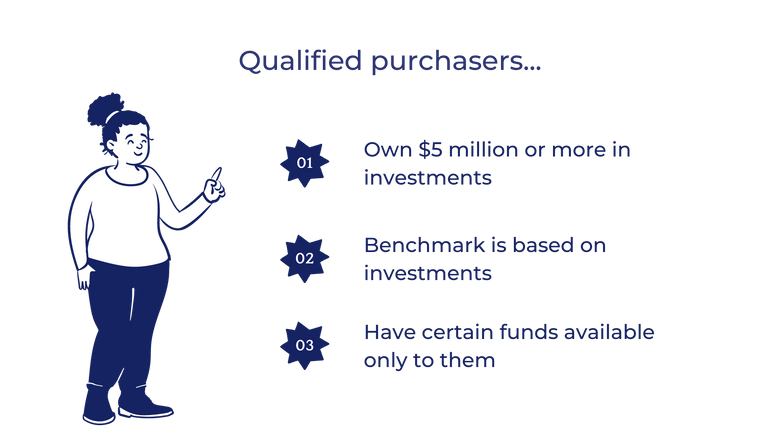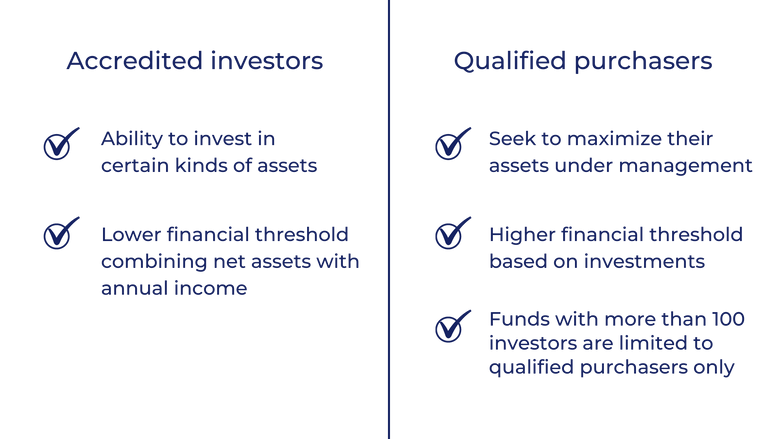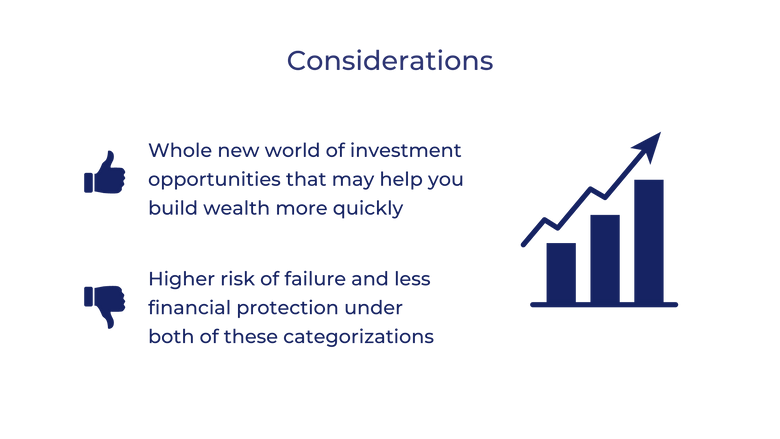Accredited Investor vs. Qualified Purchaser: What’s the Difference?
The terms accredited investor and qualified purchaser are wrongly used synonymously. We explain the differences and how you can qualify for both.
When you’re on the lookout for potential investments, you can find easily accessible publicly traded mutual funds and ETFs, which are open to anyone to invest in. However, if you’re looking for larger, more exclusive investments, such as syndicated real estate or private real estate funds, you will need to meet certain qualifications and criteria.
That’s where the regulatory terms "accredited investor" and "qualified purchaser" come into play. In order to invest in private funds, you need to meet a certain threshold of money and investments.
While some people believe the two terms are synonymous, there are key differences between the two. This article will explain what these differences are, what types of investments fall under each category, and what steps you can take to become either an accredited investor or a qualified purchaser.
What is an Accredited Investor?

An accredited investor is defined as an individual or business allowed to trade securities that are not registered with financial authorities: i.e., private funds. These unregistered sellers are only allowed to sell to accredited investors who meet requirements of income, net worth, asset size, governance status, professional experience, or financial sophistication.
The term accredited investor comes from the Securities and Exchange Commission's (SEC) Regulation D to refer to investors who have a reduced need for the protection provided by regulatory disclosure filings. These unregistered securities are riskier investments not beholden to the same disclosure standards as publicly-traded investments.
This benefits companies because they do not have to register securities with the SEC, and therefore saves them money. These unregistered share offerings, also known as private placements, are only offered to accredited investors who are financially experienced enough to understand the level of risk, as there are fewer protections offered to them under the law.
Accredited investors exist because they engage in extremely high-risk, potentially high-reward investments with a high probability of failure. Therefore, regulators protect individual investors who may not be financially equipped to handle such an investment.
Qualification Requirements
The SEC and other regulatory bodies have placed benchmarks on who qualifies as an accredited investor, outlined here:
- To be an accredited investor, you must have an annual income above $200,000. If you are filing with your spouse, your joint annual income must be above $300,000. You must have made this dollar amount for at least the past two years, with the expectation of earning the same or higher income the following year. This requirement is particular, and will not be counted if you can only provide one year’s proof of income.
- To be an accredited investor, you also need to have a net worth that exceeds $1 million, either as an individual or jointly with a spouse. This is an addition to the first annual income requirement. It is important to note that, as of the 2010 Dodd-Frank Act, the definition of an accredited investor does not count your primary place of residence toward your net worth.
- An accredited investor can also be a general partner, executive officer, or director for the company that issues unregistered securities.
- Private companies and businesses can be considered accredited investors if their organization’s assets exceed $5 million.
- If a business entity consists of equity owners who all separately qualify as accredited investors, then the entity itself also qualifies. However, organizations cannot be created solely to purchase unregistered securities.
- An individual can also qualify as an accredited investor if they can demonstrate a level of educational or professional experience with unregistered securities.
- Registered brokers and investment advisors can also qualify as of 2016.
- In August of 2020, the SEC amended their definition of an accredited investor to include measures of professional experience, knowledge, or certifications in order to expand the private markets and allow more engagement regardless of income level. This also includes knowledgeable employees of private funds, as well as SEC- and state-registered investment advisers.
What is a Qualified Purchaser?

Most private funds are exempt from registering with the SEC, as long as they are owned by less than 100 individuals -- or, if owned by more than 100 individuals, all owners must be considered qualified purchasers.
A qualified purchaser is defined as an individual or family-owned business that owns $5 million or more in investments. It is important to note that the primary difference between accredited investors and qualified purchasers is that the benchmark does not include yearly income or net assets, but instead investments.
The term "investments" is used broadly in this context and can include stocks, bonds, futures contracts, cash, cash equivalents, commodity futures contracts, real estate, financial contracts, and other assets held for investment purposes. Investments used in this context do not include a primary residence or other property used for business.
Much like accredited investors, there are certain funds available only to qualified purchasers, including many private funds, hedge funds, or venture capital funds.
Qualification Requirements
In addition to owning $5 million or more in investments, the other ways to qualify as a qualified purchaser include:
- An individual or entity that has invested at least $25 million in private capital, either on its own account or on behalf of other qualified purchasers;
- a trust that is sponsored and managed by qualified purchasers;
- or an entity owned entirely by qualified purchasers.
The important caveat for the above categories of qualified purchasers is that none of these entities can be formed for the express purpose of investing in private funds.
The SEC provides exemptions for funds open exclusively to qualified purchasers, as they are not required to register under the ICA regulatory requirements. These unregistered funds do not have to publicly disclose information such as an investment thesis or positions.
By gaining this exemption status, these funds gain access to an unlimited number of investors while still having flexibility in their corporate strategy and investment methodology.
What is a Qualified Institutional Buyer?

Another term that you might see pop up in differentiating between accredited investors and qualified purchasers is a qualified institutional buyer, or QIB. A QIB is an institutional-level investor who maintains at least $100 million in securities. It also can refer to a bank that owns and invests securities worth at least $100 million and has a net worth of at least $25 million based on an audit.
While most QIBs are also considered qualified purchasers, the term qualified institutional buyer relates to the ability to purchase securities on the secondary market, while the term qualified purchaser refers to whether a fund is exempt from ICA registration and reporting requirements.
Differences Between Accredited Investors and Qualified Purchasers

Qualified purchasers are a classification specific to funds that want to maximize their assets under management; accredited investors are a classification specific to the ability to invest in certain kinds of assets, exempt from certain protections under the SEC.
An accredited investor is an easier threshold to reach, with a lower financial threshold that combines net assets with annual income. A qualified purchaser has a much higher financial threshold to meet based on the money they have invested.
Qualified purchasers are also sometimes called super-accredited investors, since the financial benchmarks are placed much higher for individuals and businesses.
While both accredited investors and qualified purchasers are eligible for certain private funds, the difference between private funds available to either accredited investors or qualified purchasers or only qualified purchasers will be if the private fund decides to include 100 or more investors.
If there are more than 100 investors within a private fund, then it will be limited to qualified purchasers only, by the 3(c)(7) fund. However, this type of fund is less common and generally pertains more to institutional investors rather than individuals. Therefore, most private funds will not limit their investors to only qualified purchasers, only requiring that their investors are accredited.
What Types of Investments Fall Under Each?

Accredited Investors
The primary purpose of the accredited investor status is to allow individuals and companies to purchase unregistered securities. Not open to other investors with less financial know-how, only those who qualify receive the privileges of investing in these private funds.
Accredited investors are also permitted access to venture capital, hedge funds, angel investments, and complex, high-risk deals.
Qualified Purchasers
When it comes to qualified purchasers, it is your investments that are measured and not your net assets or annual income in order for you to qualify. Here are the types of investments that qualify an individual or business:
- Securities, including stocks, bonds, and notes;
- Real estate held for investment purposes, not used for the residence of business;
- Commodities futures contracts, options or commodity futures, and options on physical commodities held for investment purposes;
- Physical commodities such as gold or silver, held for investment purposes;
- Financial contracts, such as swaps or similar individually negotiated financial transactions other than securities;
- Any binding capital commitments for an investment company or commodity pool;
- Cash and cash equivalents held for investment purposes, which cannot include cash used to provide for everyday expenses or working capital as used by a business.
Verification for Each

For either accredited investors or qualified purchasers, a way to proactively prepare for becoming a verified investor is to ask your investment advisor, CPA, or lawyer to write you a letter that indicates your accreditation status.
Now let's take a deeper look at becoming each.
Accredited Investor
There is no formal process to become an accredited investor; it is up to the sellers of unregistered securities to verify individuals or companies who wish to invest in order to ensure that they meet at least one of the standards set for accredited investors.
If you believe you qualify as an accredited investor, you must approach the issuer of the unregistered securities that you want to invest in, and they will give you a questionnaire to confirm your eligibility.
In addition to the questionnaire, you will also have to provide many financial documents, including account information, financial statements, a balance sheet, tax returns, W-2 forms, salary slips, credit reports, or letters from reviews by CPAs, tax attorneys, investment brokers, or advisors.
Qualified Purchaser
The verification process for qualified purchasers, much like with accredited investors, is not an official, governmental process. It is the responsibility of each company offering private funds to confirm that its investors qualify as qualified purchasers in order to invest.
Because qualified purchaser status is based on investments rather than income or net worth, the financial documentation you must provide may vary, but the process remains the same. As long as you meet the requirements outlined above, you must simply provide your information to the company you wish to invest in and wait for them to verify your qualifications.
Should You Take Advantage of Being an Accredited Investor or Qualified Purchaser?

Both accredited investors and qualified purchasers are an exclusive class in the United States; the financial research website DQYDJ estimated that as of 2020, there were 13,665,475 households in America that qualified as accredited investors, or 10.6% of households. Though the number has gone up in recent years, it is still a comparatively small number of households that control most of America’s wealth.
If you qualify as either an accredited investor or a qualified purchaser, that opens up a whole new world of investment opportunities by way of various private funds. These investments can have higher rates of return, more diversification, and may help you build wealth more quickly.
However, these exclusive funds also have a higher risk of failure, and you are offered less financial protection under both of these categorizations. Most of the investments will have a high minimum investment, higher performance and management fees, and less liquidity.
Both accredited investors and qualified purchasers exist as classifications in order to prevent people with less money to lose and less financial knowledge from taking part in high-risk investments; if you qualify as either or both, make sure to educate yourself on the potential risks and rewards before making financial decisions.
The information provided herein is for general informational purposes only and is not intended to provide tax, legal, or investment advice and should not be construed as an offer to sell, a solicitation of an offer to buy, or a recommendation of any security by Candor, its employees and affiliates, or any third-party. Any expressions of opinion or assumptions are for illustrative purposes only and are subject to change without notice. Past performance is not a guarantee of future results and the opinions presented herein should not be viewed as an indicator of future performance. Investing in securities involves risk. Loss of principal is possible.
Third-party data has been obtained from sources we believe to be reliable; however, its accuracy, completeness, or reliability cannot be guaranteed. Candor does not receive compensation to promote or discuss any particular Company; however, Candor, its employees and affiliates, and/or its clients may hold positions in securities of the Companies discussed.
